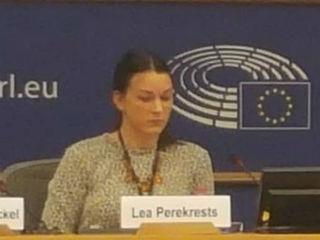A respected human rights group has questioned the European Union for using conviction statistics in Romania as “trophies in the fight against corruption.”

The European Commission, via its “Cooperation and Verification Mechanism”, has praised the high numbers of arrests, despite what HRWF says are “well-documented concerns about irregularities” involved in the clampdown. The CVM serves to assist Romania to make progress with the rule of law through judicial reform and combating corruption and the Commission’s recently-published progress report of 2017 singles out “overall praise” for the DNA. Commission Jean-Claude Juncker also recently said that Romania had made “remarkable progress” in the rule of law.
by
Martin Banks
Human Rights Without Frontiers International (HRWF) says the EU’s “rhetoric” does not reflect the reality of the situation in Romania. The European commission has praised the high number of arrests by Romania’s main anti-corruption agency, the National Anti-Corruption Directorate (DNA). The agency has seen record numbers of arrests, charges and convictions. But HRWF says it has “uncovered a “series of concerns regarding the tactics used to achieve such numbers.”
The Brussels-based HRWF, an independent campaign group, says the recent emergence of tapes allegedly showing two DNA prosecutors faking evidence and blackmailing witnesses illustrates the “failings, not success” of Romania’s anti-corruption efforts. Earlier this year, two tapes were released in the media showing DNA prosecutors faking evidence and documents, planting evidence in people’s cars and homes, changing witness declarations, faking official records, and blackmailing witnesses.
The concerns flagged by HRWF are shared by several other respected organisations National Union of the Romanian Judges and the Paris-based Magistrates Association MEDEL which raised “serious doubts” about the respect for “basic human rights” in Romania. Another body, the Henry Jackson Society, claims that the DNA, set up in 2002 to investigate and prosecute corruption, uses “various tactics of intimidation …. in keeping conviction rates as high as possible.”
At the same time, hundreds of judges in Romania have petitioned the authorities to “defend the autonomy” of the judiciary. There are 6,979 judges in Romania, 1,000 of them trained by the SRI –the country’s intelligence service. It is claimed by HRWF that having so many judges and prosecutors trained by the SRI “has an enormous impact on the judiciary.”
Lea Perekrests, is deputy director of HRWF which has detailed these and other concerns in a new report. She told this website, “HRWF is critical of the Commission for its praise, because they fail to look beyond the numbers – to see exactly how the DNA is achieving such high records.” HRWF says the EU’s praise of the apparent Romanian “crackdown” on corruption is groundless, saying the DNA “has displayed signs of severe corruption and meddling in the judicial system.” The 18-page report by HRWF on human rights in Romania says, “It is apparent that the success’ rates of the DNA are not indicative of a successful anti-corruption campaign.” Perekrests said, “HRWF is critical of the Commission for its praise, because they fail to look beyond the numbers – to see exactly how the DNA is achieving such high records.”
The European Commission, via its “Cooperation and Verification Mechanism”, has praised the high numbers of arrests, despite what HRWF says are “well-documented concerns about irregularities” involved in the clampdown. The CVM serves to assist Romania to make progress with the rule of law through judicial reform and combating corruption and the Commission’s recently-published progress report of 2017 singles out “overall praise” for the DNA. Commission Jean-Claude Juncker also recently said that Romania had made “remarkable progress” in the rule of law.
Since the appointment of Laura Codruƫa Kӧvesi as its chief prosecutor, the DNA has achieved more asset freezes, arrests and convictions than any other counterpart agency in the EU. Since 2006, the DNA has sent over 70 Romanian MPs to trial, one of the most high profile cases being that of the former prime minister, Victor Ponta, who was accused of forgery, money-laundering and tax evasion in September 2015. In February, Tudorel Toader, Romania’s justice minister, presented a 36-page critical report on the activities of Kӧvesi.
Even the 2017 progress report by the EU’s CVM conceded that “Romania still needs many reforms in order to achieve all of the Commission’s recommendations.” Concern has also been voiced several MEPs, including UK Socialist Claude Moraes,at the alleged mis- use by the Romanian authorities of the European Arrest Warrant, an important tool in combating serious cross-border crime. It has been claimed that a number of Romanians as well as other EU citizens have been indicted on “spurious charges.” Last March, Vera Jourova, the EU commissioner for justice, said the commission was “aware that sometimes EAWs are being used in a non-proportional manner.”
HRWF says that “bringing to light the seriousness” of the situation “reveals the scale of the corruption.From our investigations, it has become clear that there are a number of serious systemic problems in Romani regarding the judicial system.” Looking to the future, it says that compliance with international standards “is not likely” in the near future.




 By: N. Peter Kramer
By: N. Peter Kramer

